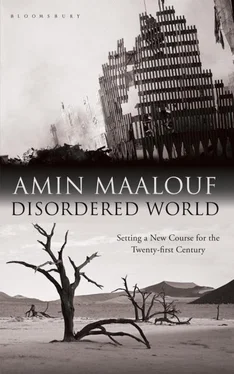For a time, after the defeat of 1967, salvation was sought in Marxism. This was the time of Che Guevara, the Vietnam War and the export version of Maoism. The Arabs drew comparisons and blamed themselves. One story which did the rounds following the 1967 disaster was about a senior Egyptian official who was furious about what had happened and exploded in front of the Soviet ambassador: ‘All the arms you sold us were worthless!’ The diplomat simply replied: ‘They were the same as we gave to the Vietnamese.’
Whether it is apocryphal or not, the joke sums up the problem well. How come that, with similar arms, one people managed to stand up to the most powerful army in the world, while another was beaten by its tiny neighbour? For some people, the answer was blindingly obvious: traditional nationalism, whether bourgeois or petit-bourgeois, had to be got rid of and replaced with a ‘coherent’ revolutionary ideology, that of peoples who came out on top. The Arab Nationalist Movement, led by Dr George Habash, officially adopted Marxist-Leninism and the armed struggle, and went on to form the Popular Front for the Liberation of Palestine, a name which contains neither the adjective ‘Arab’ nor any explicit reference to nationalism. A branch of the same movement managed to gain power in Yemen in 1969 and declare a ‘popular democracy’. Almost everywhere throughout the Arab world, from the Gulf to Morocco, intellectuals and political organisations ‘Leninised’ their credos, their alliances and sometimes simply their language. Some did it out of opportunism, others from sincere conviction because they saw in it a response to Arab defeat and progress in thought beyond social conformism and narrow nationalism. They also saw an alternative future — at least as it was imagined at that time. In fact this brief flirtation with Marxist-Leninism would just be a transitory stage between the era of nationalism and that of the Islamists, a historical parenthesis whose end would leave a bitter after-taste and for many people would contribute to increasing their feelings of discouragement, rage and impotence.
If Communism had simply been defeated by the forces it was fighting, it would probably have secretly spread thereafter as a powerful form of secular messianism. Of course, that was not how things turned out. Before it could be struck down by the ‘class enemy’, it was already widely discredited. Its approach to the arts was one of severe censorship, its concept of freedom of thought resembled that of the Inquisition, and its exercise of power sometimes brought to mind those Ottoman sultans who, on coming to power, assiduously massacred their brothers and nephews for fear that they might think of challenging them for the throne.
The examples I have in mind are not just of Stalinist purges. I have much more recent memories from the only two countries to have been governed by explicitly Marxist-Leninist movements: South Yemen from 1969 to 1990 and Afghanistan from 1978 to 1992. In both cases, scores were settled between rival factions with sub-machine guns in the middle of politburo meetings. Was this just a coincidence? Similar events happened in the 1930s, ’40s, ’50s and ’60s, not just in Moscow but also in Prague, Belgrade, Tirana, and in Beijing during the Cultural Revolution, and later in Addis Ababa when Ethiopia was ruled by a communist military junta known as the Derg — not to mention the Khmer Rouge. So was it a coincidence? No, it was routine, a modus operandi, a way of doing things.
I write this with sadness, as in these movements, good people lost their way, people who sincerely wanted to modernise their societies, who advocated the spread of knowledge, education of girls, equality of opportunity, liberation of minds, weakening of tribalism and the end of feudal privileges. Among the ruins of their betrayed hopes in Kabul and elsewhere, plants of quite a different sort were soon to take root.
The desire to be fair and concern for historical truth oblige me to add to these charges some others, with different accused.
The Soviets bear the main responsibility for Afghanistan’s descent into disorder, but it was the Americans who organised the massacre of the modernising elite in Indonesia. Until the mid-1960s, the world’s most populous Muslim nation was home to a Communist Party whose membership numbered nearly one and a half million and which participated in government under the aegis of the nationalist president, Ahmed Sukarno, the architect of independence. Sukarno had established a regime which was secular and authoritarian without being brutal, and he played a prominent role on the international stage; in April 1955, he hosted the Bandung Conference for African and Asian nations, which was the start of the Non-Aligned Movement.
Angered by the nationalisation of Indonesia’s mines and Jakarta’s links with Beijing and Moscow, the US, which was beginning to get bogged down in the Vietnam War, decided to resort to drastic measures. Its success was total. As a result of a remarkable operation, the details of which only became known decades later, the Communists and the left-wing nationalists were outlawed, rounded up and massacred in large numbers in the universities, civil service, in districts of the capital and even in the remotest villages. The most serious estimates talk of 600,000 deaths between October 1965 and summer 1966. Power was then given to General Suharto, who for over twenty years maintained a dictatorship which was corrupt and obscurantist — but resolutely anti-Communist. When the country emerged from that tunnel, the Indonesian vision of Islam, once reputed to be the most tolerant in the world, was tolerant no longer. The prospects of secularising society had been destroyed — collateral damage in the struggle against the Communist peril.
Some will point out that this happened during the Cold War. Maybe so. But if that excuse is not admissible for Communist crimes in Budapest in 1956, neither is it admissible for anti-Communist crimes in Jakarta in 1966. A crime is a crime, a massacre is a massacre, and the extermination of elites promotes regression.
Moreover, Indonesia is not the only Muslim country in which the leaders who advocated political independence and state control of their principal natural resources were countered with ferocious efficiency by the West. Sometimes this was because they were the allies of the Soviet Union. But the process also happened in reverse. Some countries turned towards Moscow because they had to face the animosity of the Western powers, which would not countenance anyone touching ‘their’ oil, ‘their’ mines, ‘their’ sugar or fruit plantations, ‘their’ Suez or Panama canals, ‘their’ military bases or ‘their’ concessions — in other words, their global supremacy.
In the case of Iran, which I have already mentioned, there is no doubt that Dr Mossadegh dreamt only of establishing a modernising pluralist democracy on the Western model. He had no intention of setting up a Marxist-Leninist dictatorship, nor an ultra-nationalist regime, nor any sort of despotism. He was an upright, self-effacing, depressive man, constantly on the point of quitting public life to go and shut himself away in his library, but he was profoundly motivated by injustice and poverty and only wanted the resources of his country to be used for the advancement of his people. It was for that reason alone that he was forced out of power in 1953 in a coup d’état planned and executed by the US and British secret services, as numerous accounts attest (some of them in the form of subsequently published confessions).
It was no coincidence that this betrayal of its own principles by the West resulted a quarter of a century later in the Iranian revolution which founded contemporary political Islam.
Читать дальше












